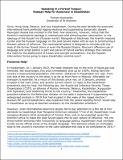Files in this item
Speaking in a forked tongue : Russian help for autocracy in Kazakhstan
Item metadata
| dc.contributor.author | Kamusella, Tomasz | |
| dc.date.accessioned | 2022-02-17T16:30:12Z | |
| dc.date.available | 2022-02-17T16:30:12Z | |
| dc.date.issued | 2022-01-09 | |
| dc.identifier | 277855443 | |
| dc.identifier | 957b51ca-9d8b-4e36-b01d-40e6b258f41a | |
| dc.identifier.citation | Kamusella , T 2022 , ' Speaking in a forked tongue : Russian help for autocracy in Kazakhstan ' Wachtyrz.eu . < https://wachtyrz.eu/speaking-in-a-forked-tongue-russian-help-for-autocracy-in-kazakhstan/ > | en |
| dc.identifier.other | ORCID: /0000-0003-3484-8352/work/108118771 | |
| dc.identifier.uri | https://hdl.handle.net/10023/24903 | |
| dc.description.abstract | Syria, Hong Kong, Belarus, and now Kazakhstan. During the past decade the autocrats’ international have perfected rigging elections and suppressing democratic dissent. Resurgent Russia has excelled in this field. Few observers, however, notice that the Kremlin’s neoimperial package is underpinned with ethnolinguistic nationalism, or the ideology of the Russkii mir (Russian world). Alongside oil blackmail, the Kremlin imposes Cyrillic and the Russian language on the post-Soviet states with an eye to constructing a Russian sphere of influence. This neoimperial sphere is designed to coincide with the area of the former Soviet Union or even the Russian Empire. Moscow’s offensive use of language and script politics is part and parcel of hybrid warfare strategy that reduces the need for the deployment of troops and outright annexations. Are the Russian intervention forces going to leave Kazakhstan anytime soon? | |
| dc.format.extent | 236098 | |
| dc.language.iso | eng | |
| dc.relation.ispartof | Wachtyrz.eu | en |
| dc.rights | Copyright © 2022 the Author. This work has been made available online in accordance with publisher policies or with permission. Permission for further reuse of this content should be sought from the publisher or the rights holder. This is the author created accepted manuscript and may differ slightly from the final published version. The final published version of this work is available at https://wachtyrz.eu/speaking-in-a-forked-tongue-russian-help-for-autocracy-in-kazakhstan/. | en |
| dc.subject | Kazakhstan | en |
| dc.subject | Russian imperialism | en |
| dc.subject | Neoimperialism | en |
| dc.subject | Post-Soviet history | en |
| dc.subject | Central Asia | en |
| dc.subject | Authoritarianism | en |
| dc.subject | Russian world | en |
| dc.subject | Democracy | en |
| dc.subject | Ethnolinguistic nationalism | en |
| dc.subject | DK Russia. Soviet Union. Former Soviet Republics | en |
| dc.subject | PG Slavic, Baltic, Albanian languages and literature | en |
| dc.subject | JN Political institutions (Europe) | en |
| dc.subject.lcc | DK | en |
| dc.subject.lcc | PG | en |
| dc.subject.lcc | JN | en |
| dc.title | Speaking in a forked tongue : Russian help for autocracy in Kazakhstan | en |
| dc.type | Journal article | en |
| dc.contributor.institution | University of St Andrews.School of History | en |
| dc.contributor.institution | University of St Andrews.St Andrews Institute for Transnational & Spatial History | en |
| dc.identifier.url | https://wachtyrz.eu/speaking-in-a-forked-tongue-russian-help-for-autocracy-in-kazakhstan/ | en |
This item appears in the following Collection(s)
Items in the St Andrews Research Repository are protected by copyright, with all rights reserved, unless otherwise indicated.

